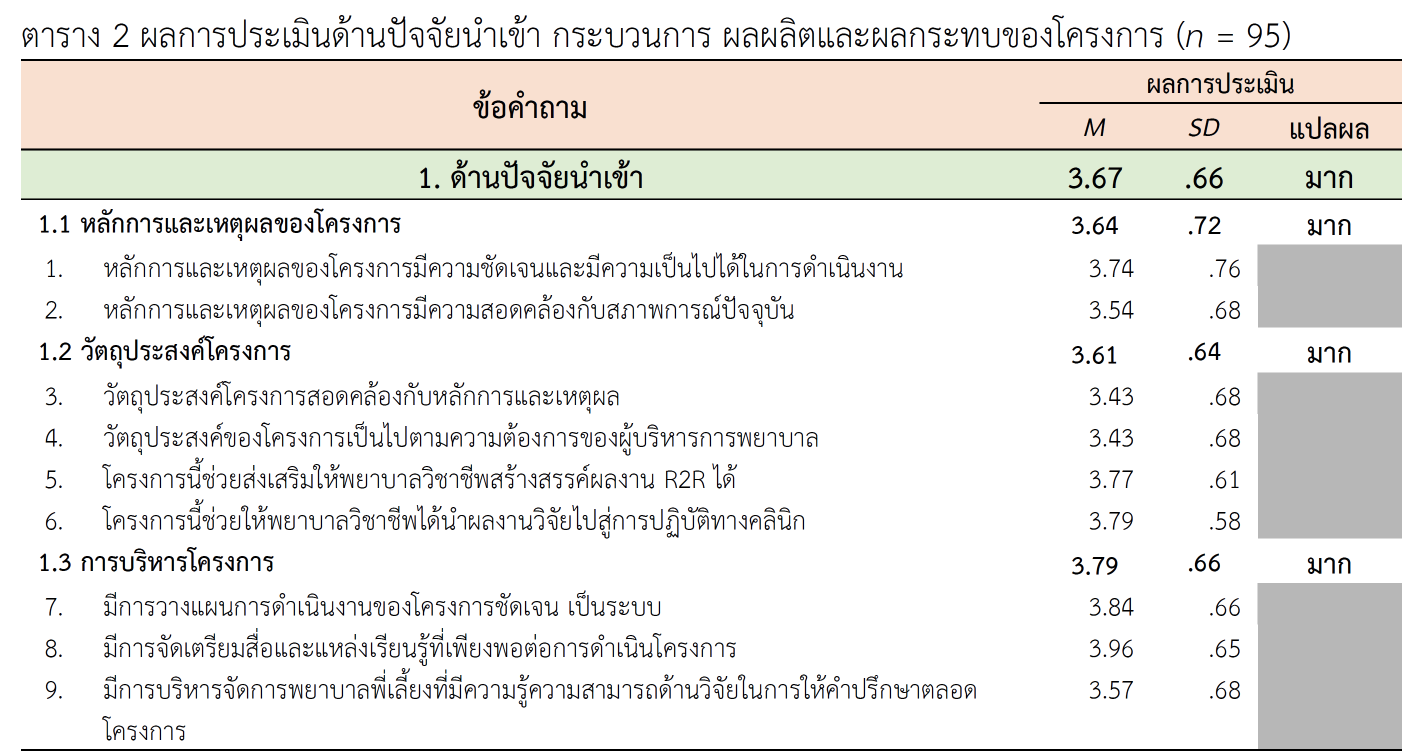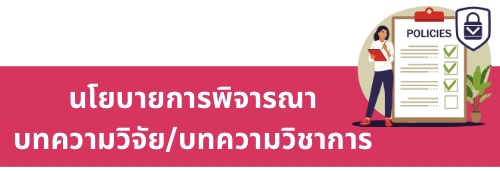การประเมินโครงการฝึกอบรมการพัฒนางานประจำสู่งานวิจัยสำหรับพยาบาลวิชาชีพในองค์กรบริหารการพยาบาล : การวิจัยเชิงประเมินแบบผสมวิธี
คำสำคัญ:
การประเมินโครงการ, งานประจำสู่งานวิจัยทางพยาบาล, การวิจัยเชิงประเมินแบบผสมวิธีบทคัดย่อ
การวิจัยนี้เป็นการวิจัยเชิงประเมินแบบผสมวิธี มีวัตถุประสงค์เพื่อประเมินโครงการฝึกอบรมการพัฒนางานประจำสู่งานวิจัยสำหรับพยาบาลวิชาชีพในองค์กรบริหารการพยาบาล และศึกษาแนวทางการพัฒนาโครงการฝึกอบรมการพัฒนางานประจำสู่งานวิจัย ตัวอย่าง คือ พยาบาลวิชาชีพที่เคยผ่านโครงการฝึกอบรมในโรงพยาบาลรามาธิบดี มหาวิทยาลัยมหิดล จำนวน 95 คน และผู้ให้ข้อมูลหลัก จำนวน 10 คน เลือกตัวอย่างแบบเจาะจง เครื่องมือวิจัยมี 2 ฉบับ คือ แบบประเมินโครงการฝึกอบรม (ปัจจัยนำเข้า กระบวนการ ผลผลิต และผลกระทบ) มีความตรงเชิงเนื้อหาอยู่ระหว่าง .60 - 1.00 มีค่าความเที่ยงด้วยวิธีหาสัมประสิทธิ์แอลฟาของครอนบาค .81 - .89 และแบบสัมภาษณ์สำหรับพยาบาลที่เคยเข้าร่วมโครงการฝึกอบรม วิเคราะห์ข้อมูลโดยใช้สถิติบรรยายและการวิเคราะห์เนื้อหา
ผลการวิจัยพบว่า 1) ด้านปัจจัยนำเข้า ด้านกระบวนการ ด้านผลผลิต และด้านผลกระทบมีความเห็นอยู่ในระดับมาก 2) แนวทางการพัฒนาโครงการฝึกอบรมให้มีประสิทธิภาพและประสิทธิผล ควรมีคลินิกวิจัยของพยาบาล มีพยาบาลพี่เลี้ยงด้านวิจัยที่มีความรู้และความสามารถด้านวิจัยทางการพยาบาล มีทักษะการเสริมแรงทางบวก และมีการติดตามความก้าวหน้าอย่างต่อเนื่อง
Downloads
เอกสารอ้างอิง
Chaikongkiat, P., & Kumkong, M. (2017). Routine to research: Driving to utilization. The Southern College Network Journal of Nursing and Public Health, 4(3), 259-270.
Chintapanyakun, T. (2019). Development of a program for enhancing research-practice nexus in clinical nursing using ICT-based learning: Design research (Doctoral dissertation). Bangkok: Chulalongkorn University.
Chintapanyakun, T., & Peanpedlerd, S. (2017). An evaluation of the training program on development of potential competency in new registered nurse under mentoring system by CIPPIEST model. Silpakorn Educational Research Journal, 9(1),
-371.
Chintapanyakun, T., Wongwanich, S., & Kaemkate, W. (2020). A clinical research-practice nexus as perceived by nurses: Needs assessment research. Journal of The Police Nurses, 12(2), 251-264.
Creswell, J. W., & Plano Clark, V. L. (2018). Designing and conducting mixed methods research (3rd ed.). Thousand Oaks, CA: Sage.
Harnlakorn, P., Juangpanich, U., Mongkolthawolchai, S., Toimamuang, U., & Thienthong, S. (2016). A survey of the routine to research and research utilization in nursing division Srinagarind hospital. Srinagarind Medical Journal, 31(4), 218-223.
Mertens, D. (2018). Mixed methods design in evaluation. Thousand Oaks, CA: Sage.
Nimmannit, A., Nopmaneejumruslers, C., Thephamongkhol, K., Ngarmtipvatana, S., & Suwan, L. (2010). Routine to research: from the beginning until today. Journal of Health Systems Research, 4(4), 575-577.
Panich, V. (2011). Networks to extend values of routine to research. Journal of Health Systems Research, 5(3), 392-397.
Pitiyanuwat, S. (2016). Methodology of evaluation: Value science (6th ed.). Bangkok: Chulalongkorn University Press.
Srikanok, W., & Untaja, P. (2014). Nursing intervention: Routine to research. Journal of The Royal Thai Army Nurses, 15(2), 15-22.
Srisasalux, J. (2009). Routine to research in health system. Journal of Health Systems Research, 3(3), 465-468.
Srisasalux, J. (2017). Roles of health systems research institute to extension R2R to policy. Bangkok: Health Systems Research Institute.
Stufflebeam, D. L., & Coryn, C. L. S. (2014). Evaluation: Theory, models and applications (2nd ed.). San Francisco: Jossey-Bass.
Stufflebeam, D. L., & Shinkfield, A. J. (2007). Evaluation: Theory, models and applications. San Francisco: Jossey-Bass.
Sukawattana, S., Lavin, W., & Poolpanitoopatum, S. (2020). A Comparative study of differences of selected factors between groups of master’s degree nurses with and without research. Journal of Nursing Science & Health, 43(4), 135-145.
Tashakkori, A. M., Johnson, R. B., & Teddlie, C. B. (2020). Foundations of mixed methods research: Integrating quantitative and qualitative approaches in the social and behavioral sciences (2nd ed.). California, CA: Sage.
Teddlie, C., & Tashakkori, A. (2009). Foundations of mixed methods research: Integrating quantitative and qualitative approaches in the social and behavioral sciences. Thousand Oaks, CA: Sage.
Theinsri, T., & Oumtanee, A. (2020). Developing a routine to research: Voices of professional nurses and key stakeholders. Royal Thai Navy Medical Journal, 47(1), 20-36.
Wongwanich, S. (2016). Research methodology in education: Provocation of new ideas. Bangkok: Icon printing.
Wongwanich, S. (2021). Design research in education. Bangkok: Chulalongkorn University Press.
Wongwanich, S., & Khaikleng, P. (2020). Text book of evaluation. Bangkok: Faculty of Education, Chulalongkorn University.

ดาวน์โหลด
เผยแพร่แล้ว
รูปแบบการอ้างอิง
ฉบับ
ประเภทบทความ
สัญญาอนุญาต
ลิขสิทธิ์ (c) 2024 วารสารพยาบาลตำรวจ

อนุญาตภายใต้เงื่อนไข Creative Commons Attribution-NonCommercial-NoDerivatives 4.0 International License.
ผลงานที่ได้ตีพิมพ์แล้วจะเป็นลิขสิทธิ์ของวารสารพยาบาลตำรวจ














